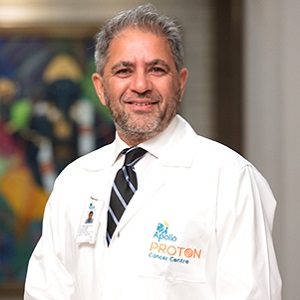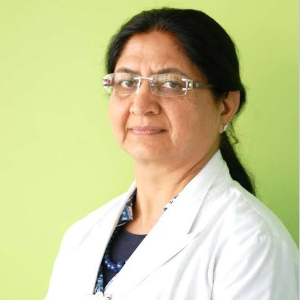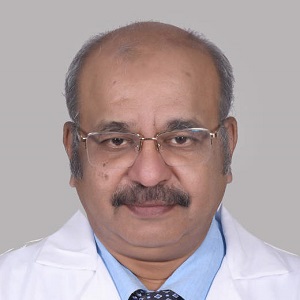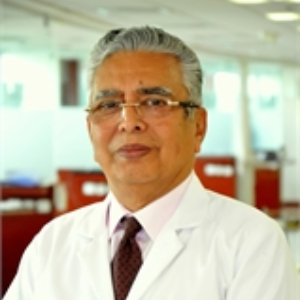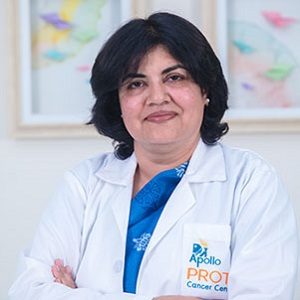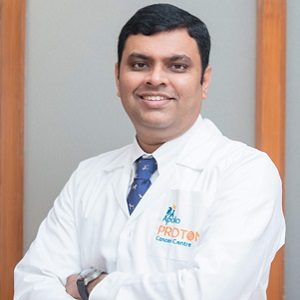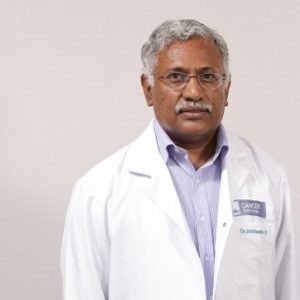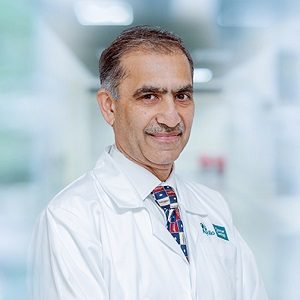Best Doctors in India for IMRT
- Neuro Oncologist, Chennai, India
- Over 28 years’ experience
- Apollo Proton Cancer Centre
Profile Highlights:
- Dr. Rakesh Jalali is undoubtedly one of the top Radiation Oncologists in the country who is renowned for his high-precision radiation techniques.
- He provides a wide range of radiation treatments customized to treat different kinds of cancers.
- Dr. Jalali, who has a remarkable 28-year of experience in the field of Neuro-Oncology, is highly proficient in employing sophisticated radiation treatment procedures, such as Electron Beam Radiation treatment (3DCRT), IMRT, IGRT, VMAT, BRT, SABR, DIBH, Brachy Treatment, TBI, and TSET, as well as 4D Gated Radio Treatment. These treatments are carefully employed to treat various kinds of cancers such as brain tumors, breast cancer, lung cancer, prostate cancers, and many more.
- Radiation Oncologist, Gurugram, India
- Over 32 years’ experience
- Medanta-The Medicity, Gurgaon
Profile Highlights:
- Dr. Tejinder Kataria is a globally renowned Radiation Oncologist whose pioneering contributions have significantly advanced cancer treatment in India.
- With over 35 years of experience, she has been instrumental in introducing cutting-edge technologies and establishing prominent oncology departments across prestigious institutions. She is currently the Chairperson of Radiation Oncology at Medanta – The Medicity in Gurugram, New Delhi.
- Dr. Kataria played a pivotal role in founding the Department of Radiation Oncology at Rajiv Gandhi Cancer Institute, New Delhi, and Artemis Health Institute, Gurugram. She also established the Division of Radiation Oncology at Medanta, Gurugram, where she continues to innovate and lead.
- Her interests lie in Stereotactic Radio Treatment (SBRT), Image-Guided Radio Treatment (IGRT), Intensity Modulated Radio Treatment (IMRT), 3-D Conformal Radiation (3D CRT), PET-CT, MRI, SPECT, DSA and CT-Simulator fusion for treatment planning.
- Top Radiation Oncologist | Apollo Hospital, New Delhi, India
- 20+ Years Experience
- Indraprastha Apollo Hospital, New Delhi
Profile Highlights:
- Dr. G K Jadhav is one of the leading radiation oncologists in India.
- He has a complex understanding of cancer biology, clinical care, and radiation physics.
- Dr. Jadhav has an experience of more than 20 years in the field of radiation oncology.
- Radiation Oncologist, Gurugram, India
- Over 40 years’ experience
- Artemis Hospital, Gurgaon
Profile Highlights:
- Dr. Subodh Chandra Pande is a well-known radiation oncologist in India. He has a long and rich clinical and teaching experience in the specialty of radiation oncology.
- He included a Dual Energy Linear Accelerator with Multi-Leaf Collimator at Bhagwan Mahaveer Cancer Hospital and Research Centre (BMCHRC), Jaipur & which was a first for the State of Rajasthan.
- Radiation Oncologist, Chennai, India
- Over 33 years’ experience
- Apollo Proton Cancer Centre
Profile Highlights:
- Dr. Sapna Nangia is a highly proficient clinical and radiation oncologist with versatile experience in cancer management.
- She has an experience of more than 33 years as a doctor across various eminent institutions in the country.
- Radiation Oncologist, Chennai, India
- Over 15 years’ experience
- Apollo Proton Cancer Centre
Profile Highlights:
- Dr. Srinivas Chilukuri has been in one of the top layers of Oncologists in India. He is a renowned Radiation Oncologist with extensive experience. He is also a major thought leader in the field, particularly with regard to high precision radiation treatment, which includes Particle Beam Radiation.
- Radiation Oncologist, Chennai, India
- Over 25 years’ experience
- Apollo Cancer Centre
Profile Highlights:
- Dr. Mahadev P is a radiation oncologist with 25+ years of experience and has played a major role in starting the Diplomate of National Board course in Radio Treatment in 2005.
- After getting trained in Australia, Dr. Mahadev P started Prostate Brachy Treatment at Apollo Specialty Cancer Hospital.
- Dr. Mahadev is also trained in Cyberknife radiosurgery – the only system in the world to treat tumors in the body with sub-millimeter accuracy.
- Radiation Oncologist, Chennai, India
- Over 24 years’ experience
- Apollo Cancer Centre
Profile Highlights:
- Dr. Rathna Devi is a senior Radiation Oncologist who has an experience of 24 years in the field.
- She completed MBBS from M.S. Ramaiah Medical College, Bangalore University, and a Diploma in Radio Treatment from Madras Medical College, Dr. MGR Medical University.
- Dr. Rathna Devi’s areas of expertise include Cranial Cyberknife Radiosurgery, Intensity Modulated Radio Treatment (IMRT), and Stereotactic Body Radio Treatment (SBRT).
- Radiation Oncologist, Chennai, India
- Over 10 years’ experience
- Apollo Proton Cancer Centre
Profile Highlights:
- Dr. Ashwathy Susan Mathew has been an eminent doctor hailing from the Department of Radiation Oncology Apollo Proton Cancer Centre, Chennai.
- She has performed extensive research in the diagnosis and treatment of Gastro-Intestinal Cancers and related metastasis.
- She has been awarded the Parvati Devi Gold Medal for Best Paper at the 34th Annual Conference of the Association of Radiation Oncologists of India.
- Radiation Oncologist, Chennai, India
- Over 30 years’ experience
- Apollo Cancer Centre Chennai
Profile Highlights:
- Dr. Sanjay Chandrasekar is one of the top Radiation Oncologists in Chennai who has an extensive experience of more than 30 years in the field.
- He is currently serving as a Senior Consultant of Radiation Oncology at Apollo Cancer Centre in Chennai.
- His 30+ years-long journey in the field of oncology has brought him a lot of appreciation and recognition in his medical career.
- He has a great deal of expertise treating a range of cancer ailments such as brain tumors—both benign and malignant, head and neck cancers, lung cancer, and uro-gynecological cancers.
- Over the years he has also published numerous papers in peer-reviewed journals on both national and international level. In addition, he has received several honors and commendations for his efforts.
Best Hospitals in India for IMRT
- City: Gurugram, India
Hospital Highlights:
- One of India’s best and largest multi-specialty hospitals, Medanta was built with the aim to bring India to the highest standards of medical care. The hospital has been providing the best medical services to its patients, since its inception, with care, commitment, and compassion.
- Equipped with 1250 beds, the hospital was founded by Dr. Naresh Trehan in the year 2009 with an aim to provide the best medical care at affordable costs. The hospital is spread across 43 acres and includes 45 operation theatres and 350 beds dedicated solely to ICU. The hospital includes over 800 doctors, and more than 22 specialty departments and has a dedicated floor for individual specialty in order to offer the best services under one roof.
- The hospital is considered one of the premier institutes in India for Cardiac Care and includes staffs and members of high caliber. The hospital has 6 distinct centers of excellence.
- City: Gurugram, India
Hospital Highlights:
- Artemis Hospital, established in 2007 in Gurugram, India, is a leading multi-specialty institution known for its excellence in patient care and advanced medical technology, offering comprehensive services across specialties like Cardiology, Oncology, Neurology, Orthopedics etc.
- Renowned for its patient-focused care, Artemis Hospital combines state-of-the-art infrastructure with a team of internationally trained doctors and surgeons, ensuring the highest standards of medical treatment.
- Accredited by JCI and NABH, Artemis Hospital meets global healthcare quality and safety standards, reflecting its commitment to providing compassionate, personalized care.
- The hospital is recognized for utilizing cutting-edge diagnostic and ther*peutic techniques, ensuring patients receive accurate diagnoses and effective treatments tailored to their needs.
- City: Chennai, India
Hospital Highlights:
- The Apollo Proton Cancer Centre in Chennai is the most sought-after private cancer hospital in India. It is an integrated facility that provides cutting-edge, all inclusive cancer treatment to patients all over the globe.
- The hospital is a part of the renowned Apollo Group which has a large network of over 74 hospitals in India and across the globe. Out of the 74 hospitals, 21 of them are cancer centres. However, Apollo Proton Cancer Centre is the only cancer hospital to have JCI accreditation.
- The Centre, which was established on the principles of excellence and expertise, unites a formidable medical staff led by some of the most illustrious figures in cancer treatment.
- The hospital follows the global ASTRO Model Policy. It is the same global policy which is followed by countries like USA, UK, and Europe.
- Apollo Proton Cancer Centre is among the very few hospitals in India to receive patients from First World countries such as USA, Canada, New Zealand, Australia, Singapore, Thailand, etc.
- Apart from that, it is also the first hospital in Chennai to receive patients from several countries like Uzbekistan, Kazakhstan, Turkmenistan, Georgia, Armenia, Azerbaijan, SAARC countries (Bangladesh, Nepal, Sri Lanka, Maldives, Bhutan, Afghanistan, and Pakistan), South Africa, Turkey, Egypt, etc.
- In fact, there is a dedicated team at the Apollo Proton Cancer Centre that serves only international patients. Thus, on a monthly basis, the Centre receives patients from across 32 countries.
- Moreover, there are certain treatments in Apollo Proton Cancer Centre that are not available in any other centre. APCC addresses all types of possible cancers that are usually not covered by any other centre.
- City: New Delhi, India
Hospital Highlights:
- Over the last 33 years, the Fortis Escorts Heart Institute has set new standards in cardiac treatment with groundbreaking research. It is now known around the world as a centre of expertise for Cardiac Bypass Surgery, Interventional Cardiology, Non-invasive Cardiology, Paediatric Cardiology, and Paediatric Cardiac Surgery.
- The hospital has cutting-edge laboratories that perform a wide range of diagnostic tests in Nuclear Medicine, Radiology, Biochemistry, Haematology, Transfusion Medicine, and Microbiology.
- Fortis Escorts Heart Institute boasts a diverse group of bright and experienced doctors who are backed up by a team of highly qualified, experienced, and devoted support professionals as well as cutting-edge equipment such as the recently installed Dual CT Scan.
- Approximately 200 cardiac doctors and 1600 personnel currently collaborate to manage over 14,500 admissions and 7,200 emergency situations each year. The hospital now has a 310-bed infrastructure, as well as five cath labs and a slew of other world-class amenities.
- City: Gurugram, India
Hospital Highlights:
- Fortis Memorial Research Institute (FMRI) is a premier multi-super-specialty, quaternary care hospital, known for its exceptional international faculty, top-tier clinicians, super-sub-specialists, and specialized nurses, all supported by cutting-edge technology.
- It is the flaship hospital of Fortis Healthcare Limited, part of IHH Healthcare Berhad, a leading integrated healthcare services provider in India. As one of the country’s largest healthcare organizations, Fortis operates 28 healthcare facilities with over 4,500 operational beds (including O&M facilities) and more than 400 diagnostic centers (including joint ventures).
- Recognized as one of the top hospitals in India, FMRI serves as a leading referral center and aspires to be the ‘Mecca of Healthcare’ for India and beyond. Its 11-acre campus is a testament to its commitment to providing world-class healthcare.
- Accredited by JCI and NABH, FMRI is dedicated to maintaining the highest standards of healthcare quality and safety, ensuring that every patient receives the best possible care. The hospital’s reputation is further enhanced by its state-of-the-art facilities and innovative medical practices.
- City: New Delhi, India
Hospital Highlights:
- The Indian Spinal Injuries Center (ISIC), provides state-of-the-art facilities for the management of all types of spinal ailments.
- Staffed with internationally trained, acclaimed, and dedicated spine surgeons, the hospital provides cutting-edge medical & surgical technology. The hospital provides comprehensive management of spinal injury, back pain, spinal deformities, tumors, osteoporosis, etc.
- The hospital performs motion-preserving spine surgeries including disc replacement and dynamic fixation, and minimally invasive spine surgeries such as endoscopic disc excision.
- The orthopedic service of the hospital covers all orthopedic ailments including trauma, joint diseases & replacements, oncology, pediatric orthopedics & upper limb ailment.
- City: Faridabad
Hospital Highlights:
In the sprawling city of Faridabad, where healthcare needs are diverse and ever-evolving, one institution has consistently stood out as a beacon of excellence in the field of medicine—Marengo Asia Hospital. Established with a vision to provide world-class healthcare services to the community it serves, Marengo Asia Hospital has emerged as a trusted name synonymous with quality, compassion, and innovation in healthcare.
- City: New Delhi, India
Hospital Highlights:
- Indraprastha Apollo Hospital is a 700-bedded multispecialty hospital in the heart of the capital of India. It is a part of Apollo Hospital group, one of India’s most reputed healthcare chains. Indraprastha Apollo Hospital has been accredited by Joint Commission International, making it the first internationally accredited hospital in the country in 2005.
- There are 52 specialties in the hospital with one of the best cardiology centers in the country. The hospital is also equipped with State of the art infrastructure facilities with the largest Sleep Lab in Asia and the largest number of ICU bed facilities in India.
- The latest and highly advanced technologies that are installed in the hospital include Da Vinci Robotic Surgery System, PET-MR, PET-CT, Cobalt-based HDR, Brain Lab Navigation System, Tilting MRI, Portable CT scanner, 3 Tesla MRI, 128 Slice CT scanner, DSA Lab, Endosonography, Hyperbaric Chamber and Fibro scan.
- City: New Delhi, India
Hospital Highlights:
- One of the well-regarded providers in India committed to the highest standards of clinical excellence and patient care, Max Super Specialty Hospital is a part of Max Healthcare, which is the second-largest healthcare chain in India. Regarded as one of the most well-regarded healthcare providers in the country, Max Super Specialty Hospital is committed to the highest standards of clinical excellence as well as patient care. The hospital is also equipped with the latest technology as well as cutting-edge research. The hospital is known to deliver and ensure the highest level of patient care.
- The hospital has more than 500 beds and offers treatment for over 35 specialties. The hospital also holds the credit of having installed the first Brain Suite in Asia. This is a highly advanced Neurosurgical machine that allows MRI to be taken while surgery is ongoing.
- Other advanced and latest technologies are also installed in the hospital such as the 1.5 Tesla MRI machine, 64 Slice CT Angiography, 4D ECHO, LINAC, and 3.5T MRI machine.
- City: Kolkata, India
Hospital Highlights:
- Founded in 2017, the HCG EKO Cancer Centre is a committed, all-inclusive cancer care facility in Kolkata.
- The hospital was collaboratively established by India’s leading cancer care provider HCG (HealthCare Global Enterprises Ltd.), and EKO Diagnostic Pvt. Ltd., a top diagnostic and imaging chain in Eastern India.
- With 88 beds, the hospital provides a full spectrum of services including diagnosis, prevention, screening, second opinions, treatment, rehabilitation, follow-up, and palliative care.
- Additionally, the hospital contains a day-care chemotherapy ward, Neutropenic ward, medical ICU, pharmacy, blood bank, and an IPD wing.
- At HCG EKO Cancer Centre Kolkata, a large team of cancer experts with experience in medical oncology, surgical oncology, radiation oncology, hemato oncology, BMT, and nuclear medicine collaborate to offer a variety of treatment options under one roof.
- Furthermore, the hospital is also known for employing the most advanced radiation technology such as, the Radixact, a next-generation TomoTherapy equipment that provides greater radiation delivery precision.
IMRT
Intensity-modulated radiation therapy, known as IMRT, is an advanced type of radiation therapy, which is used for treating cancer as well as noncancerous tumors. This procedure uses advanced technology in order to manipulate photon and proton beams of radiation to conform to the shape of a tumor. The goal of the procedure is to conform the radiation dose to the target while avoiding or reducing exposure of healthy tissue to limit the side effects of treatment.
Purpose
The procedure is used mostly to treat prostate cancer, head and neck cancers, gastrointestinal and gynecologic cancers, brain tumors and lung cancers, among others.
Doctors generally consider this procedure when a tumor partially surrounds or is close to a healthy part of your body that cannot tolerate the full dose of radiation being given to the tumor. When the tumor is not near any sensitive area, IMRT might not be required. You can talk in detail with the radiation team regarding which type of treatment is best for you.
Preparation
Before the treatment, doctors need to conduct a physical examination and medical history. After this is done, there is a treatment simulation session, which might include a CT scan. A small mark or a tattoo might be placed on the skin of the patient, as this can help to align and target the equipment. This radiation oncologist can use this scan to make an individual plan for the patient.
Sometimes it might be important to follow a certain bowel and bladder preparation regimen, or too fast, before the simulation and treatment. The patient might be injected with intravenous contrast material, during the CT scan, as it can help to define the tumor better.
Sometimes additional scanning procedures, which include magnetic resonance imaging (MRI), or positron emission tomography (PET) might also be required for IMRT planning. These diagnostic images can be merged with the planning CT, to help the radiation oncologist determine the exact location of the tumor target.
Sometimes it is also necessary to insert radiodense markers into the target for more accurate positioning. In general, IMRT sessions usually begin around a week or two after the simulation.
The team involved in this procedure generally includes the medical oncologist, medical physicist, radiation therapist, dosimetrist, and radiation therapy nurse.
Procedure
Generally, IMRT often requires multiple treatment sessions on different days. The radiation oncologist will consider the type, location and size of the tumor, doses to normal structures, as well as the health of the patient, to decide the number of treatment. Generally, patients are scheduled for IMRT sessions five days a week for about a month or two.
At the beginning of each session, first, the radiation therapist will position the patient on the treatment table, guided by the marks on the skin, i.e. tattoos that help identify the treatment area. If there were molding devices made, then they will be used to help the patient maintain a proper position. The patient might be repositioned during the procedure as well. Imaging systems on the treatment machine such as X-ray or CT might be used for checking positioning and marker location.
After the patient is positioned, the radiation will be turned on for a brief time. For each position of the machine, the radiation is on for only a minute or two. During the entire procedure, the machine rotates over you, while you lie as still as you can, breathe normally and relax.
The treatment generally should not take more than 30 minutes.
After the procedure
Risks and complications
Though IMRT has many advantages, it might not always be the best option for patients. Sometimes there are side effects of radiation treatment which may include problems that might occur as a result of the treatment itself as well as from radiation damage to any healthy cells in the treatment area.
The severity of the side effects that you experience can generally depend on the type of radiation and dosage that was prescribed and the part of the body which was being treated. Let your doctor and healthcare team know if you experience any side effects so that they can help you to manage them.
Side effects might be early or in some cases, late. Early side effects generally occur during or immediately after the treatment and should typically go in just a few weeks.
Some of the early side effects of radiation therapy can include tiredness or fatigue as well as skin problems. Skin in the treatment area can sometimes become more sensitive, red, irritated, or even swollen. Other skin changes generally include itching, dryness, peeling, and blistering.
Some of the early side effects may include the following:
- Mouth problems and difficulty swallowing
- Headaches
- Hair loss in the treatment area
- Soreness and swelling in the treatment area
- Eating and digestion problems
- Diarrhea
- Nausea and vomiting
- Urinary and bladder changes
Rarely, late side effects generally occur months or years after the treatment and are generally permanent. They may include:
- brain changes
- spinal cord changes
- colon and rectal changes
- infertility
- joint changes
- lung changes
- kidney changes
- secondary cancer
- lymphedema
- mouth changes
There is also a slight risk of cancer from radiation therapy. Therefore it is important that you are assessed regularly by the radiation oncologist for complications.

